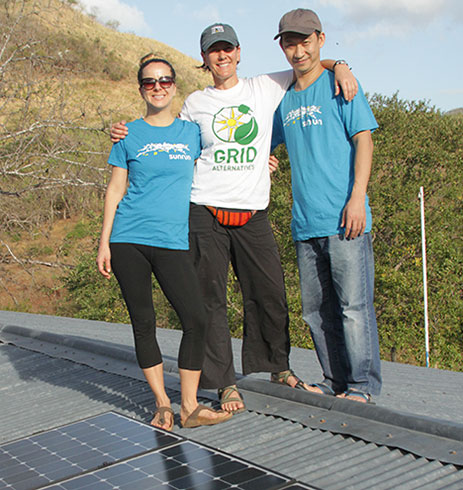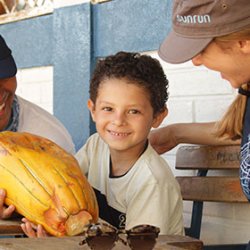From Nicaragua’s bustling capital, Managua, down volcanic roadways, past countless lakes, beyond the last power lines, lies Portrero Sur – a quiet agricultural community of about 50 families.
On a hot February afternoon, a group of Americans piled out of a truck bed after a long journey. Covered in dust and sweat, we stretched our legs and got our first glimpse of what would be our home for the next four days – a tiny village of tin and wood houses surrounded by dense forest and farmland. We were a group of fourteen: four staff members from GRID Alternatives and ten employees from Sunrun, a solar power installation, financing and leasing company headquartered in San Francisco. We were there to help install an off-grid solar electric system on the roof of the village school, bringing electricity to this community for the first time.
As we unloaded luggage, solar panels, and tools to be carried down to the school, a two room building that serves as the hub for this small community, the villagers came out to help carry the heavy items. We exchanged timid “holas” and shy smiles, and had a round of introductions before our host families guided us to their homes for a lunch of fresh tortillas, rice, beans and home-made cheese. We would stay in their homes for three nights while we worked, sleeping under mosquito nets on wooden cots set on spotlessly swept dirt floors.
 With such a hard-working and solar savvy team, the installation work flew by, leaving plenty of time to swim in the nearby swimming hole and the play in the community’s first coed baseball game. We finished the work a day early, and the whole community flocked to the school to see it lit up for the first time. A circle quickly formed, with two volunteers serving as the nucleus for cultural exchange. Questions like, “What does California look like?” and “Do you have a boyfriend?” were asked to Ashley, while Jameson wowed them with card tricks. The school was buzzing as kids ran around, women talked, and the community came together after sunset like never before. The next evening, our last in Potrero Sur, we gathered again in the lit-up schoolroom to dance and celebrate late into the evening.
With such a hard-working and solar savvy team, the installation work flew by, leaving plenty of time to swim in the nearby swimming hole and the play in the community’s first coed baseball game. We finished the work a day early, and the whole community flocked to the school to see it lit up for the first time. A circle quickly formed, with two volunteers serving as the nucleus for cultural exchange. Questions like, “What does California look like?” and “Do you have a boyfriend?” were asked to Ashley, while Jameson wowed them with card tricks. The school was buzzing as kids ran around, women talked, and the community came together after sunset like never before. The next evening, our last in Potrero Sur, we gathered again in the lit-up schoolroom to dance and celebrate late into the evening.
After days of refreshing dips in the swimming hole and after-dinner storytelling under the star-clustered sky, it was hard not to feel envious of the peaceful pace of life in Portrero Sur. The land and people there are beautiful, but the struggles are also great. We were not around long enough to experience what it is like to need emergency care and be far from any clinic, to get ill from contaminated drinking water, or to have to send your children to the fields instead of to school.
I will never forget the moment we stepped backed into the truck on the last day. The community formed a wall around our vehicle, standing tall and proud, yet unable to hold back tears as we hugged and said goodbye. As we headed down the dirt road and the power lines began to re-appear, and I knew that we had taken even more from our experience than the solar power we had left behind.
By Jessica Nelson, GRID Alternatives Multi-Media Storytelling Coordinator

